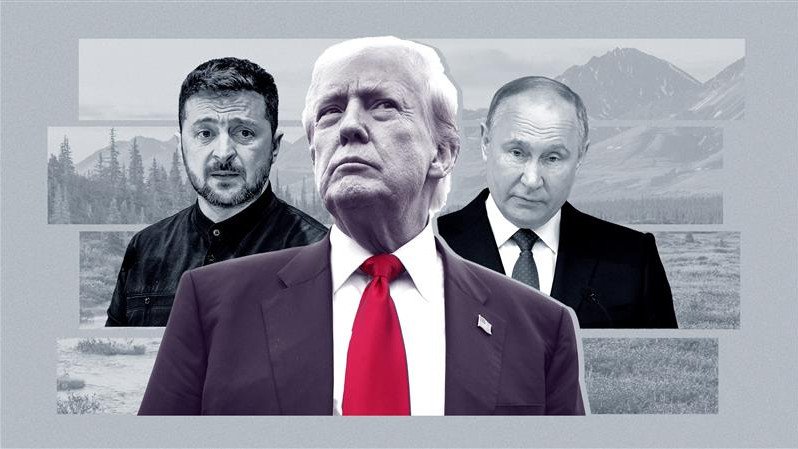THE NEW YORK TIMES: Europe is playing a long game on Ukraine, and with Trump
THE NEW YORK TIMES: Analysts say there are advantages for Europe in hashing out a full plan for security guarantees before Putin commits to a ceasefire or a sit-down with Zelensky.

European leaders praised President Donald Trump for his efforts to quickly broker a peace deal to end the war in Ukraine last month. But they also expressed scepticism that he could succeed on the accelerated timeline he envisioned after meeting President Vladimir Putin of Russia in Alaska.
As prospect of immediate talks has dimmed, they have instead turned their energy toward keeping Trump engaged, and more or less on their side.
That strategy, expressed both in public comments and private briefings, is simple enough: try to show Trump that Europe is willing to do the hard work of preparing for a post-war future in Ukraine — and that Putin is not.
Sign up to The Nightly's newsletters.
Get the first look at the digital newspaper, curated daily stories and breaking headlines delivered to your inbox.
By continuing you agree to our Terms and Privacy Policy.That’s why European leaders joined, in person and virtually, a gathering in Paris on Thursday for a new round of talks seeking to piece together a plan to protect Ukraine from another invasion once the war ends.
And it is why they continue to tell Trump that it is Putin’s fault the war has not ended yet, because the Russian leader has not followed through on his promises of serious negotiations.
“The Europeans are prepared to make a decisive contribution to strong security guarantees for Ukraine after a negotiated solution,” a German government spokesperson, Stefan Kornelius, proclaimed after the meeting.
That solution still appears far off. There are few public signs that Putin has softened any of his maximalist demands for a peace agreement, though Vice President JD Vance and others in Trump’s administration promise Russia has made meaningful concessions.
Russian forces continue to bombard Ukraine, including targeting European and American assets in Kyiv, and killing civilians.
Despite Trump’s predictions of a quick meeting between Putin and President Volodymyr Zelenskyy of Ukraine, the Russian leader has refused to commit to it.
European leaders never believed Putin would meet Zelenskyy. Putin does not even consider Ukraine a country. So they have sought to turn Putin’s reluctance to their advantage, using it to wring a fresh commitment from the White House for economic penalties on Russia if Putin does not agree to talks soon.
Trump this week acknowledged the delays in setting any actual meeting. “I’ve been talking about it with President Putin and President Zelenskyy,” Trump told CBS News. “Something is going to happen, but they are not ready yet.”
The American president conceded the conflict had proved more difficult to resolve than other peace agreements he claims credit for facilitating. “Frankly, the Russia one, I thought, would have been on the easier side of the ones I’ve stopped, but it seems to be something that’s a little bit more difficult than some of the others,” he said.
European leaders have amplified their criticisms of Putin this week, with comments that appear aimed at Trump, who has basked in his good personal relationship with the Russian leader.
Chancellor Friedrich Merz of Germany called Putin “a war criminal.” President Emmanuel Macron of France called him “a predator and an ogre.”
Merz and Macron, along with Prime Minister Keir Starmer of Britain, are leaders of the so-called coalition of the willing, which notably also includes nations whose leaders have good relations with Trump, like Finland. The coalition’s efforts to flesh out security guarantees this week were a rejoinder to Russia, analysts said.
“The European leaders are sending a signal to the White House that the strategy of vague, pompous, but unfulfilled announcements needs to end,” Karl-Theodor zu Guttenberg, a former German defence minister, said this week.
Some details of the security guarantees remain unresolved. Among them is the crucial question of whether Germany will commit troops to help keep the peace in Ukraine, or only supply training, weapons and air and naval support for the Ukrainian military.
But Europeans are seeking to present a message of unity.
“Action speaks for itself,” Kai Sauer, Finland’s ambassador to Germany, said in an interview. “We have a group of friends of Ukraine, which is larger than Europe. It is meeting on a regular basis and ready to take responsibility” for post-war peace.
Sauer added that any peace deal still needed two ingredients: Russian agreement to a ceasefire with Ukraine, and support from the United States.
Analysts say there are advantages for Europe in hashing out a full plan for security guarantees before Putin commits to a ceasefire or a sit-down with Zelenskyy.
Such a plan could help reassure Zelenskyy as he contemplates difficult trade-offs in negotiations, including whether to effectively cede to Moscow some Ukrainian land that has been taken by Russian forces.
“For Ukraine, in order to end this war, they need to be sure there won’t be a new war in the next couple of years,” said Jana Puglierin, a senior policy fellow at the European Council on Foreign Relations. “In order to be able to make that credible, they need some reassurance, some guarantees.”
Still, she added, “95 per cent of all of this is to keep Trump happy and keep a seat at the table.”
This article originally appeared in The New York Times.
© 2025 The New York Times Company
Originally published on The New York Times
